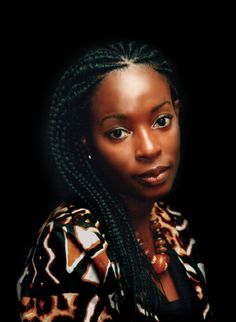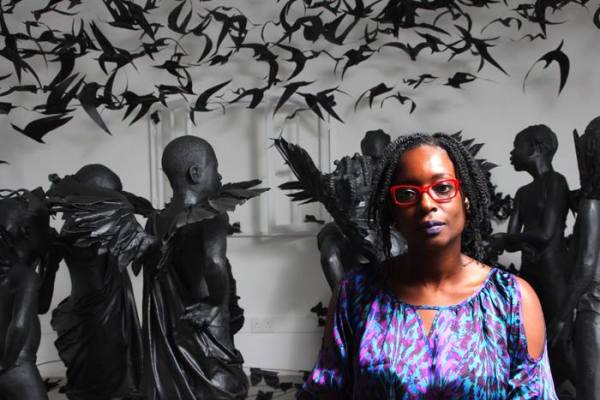Peju Alatise: The Nigerian artist transcending barriers

Born in 1975 in the Nigerian city Lagos, Peju and her seven siblings were raised within a fairly traditional Muslim family. Her younger brother Layi recalls how his siblings would often grapple with their father’s religiosity.
He says Peju in particular would clash with him and other adults on topics ranging from philosophical approaches to life, to politics and religious beliefs.

A young Peju was also shaped by her observations on the role of women in Nigerian society, increasingly questioning the status quo.
The artist originally faced opposition to her chosen career. Her father saw art as a waste of time, preferring that his daughter pursue what he perceived as a more economically stable profession. “Two years before he died, he had a change of heart,” she recalls. “It’s funny how I could be so independent and think that I am so confident but still need my father’s approval.”
Her mother, on the other hand, provided unwavering support, which Peju attributes to an encounter with a spiritualist who foresaw fame in her daughter’s future. He claimed that art would take Peju all over the world and it would earn her “different currencies”. “My mum was like, “Ah, she’s going to be rich!” Peju laughs.
She chose to train as an architect at university and she cherishes that time to this day. “Architecture teaches you how to see,” Peju explains. “[It] got me really disciplined. With architecture you work with time, you work with very tangible ideas. Architecture actually teaches a method of thinking that I don’t regret. It’s very logical, and I approach life that way.”
But Peju is adamant that she didn’t “become” an artist. “I never got into art, I was always an artist. I always loved to paint, I always loved to draw and make things. My interest was always in being creative.”
It was, however, only after seeing an exhibition in Lagos by Nigerian artist David Dale, that a 15-year-old Peju realised that art was a viable profession. “I thought people were just born creative and it was just an existence. I thought it’s like being born tall or short until I went to a gallery and then I saw people sell [art]. I was really surprised.”
This realisation planted a seed, and soon after that exhibition she began her informal education in the craft. Peju would visit Dale’s studio on mainland Lagos during her school holidays to see pieces in progress and watch his studio assistants at work. “It was such a mess, but it was [a] glorious mess,” she gushes.
Peju would also regularly visit Jakande, a crafts market in Lagos, where she would spend time with the artisans sculpting objects, painting and piecing together jewellery. This community of creatives provided her training, she says.
The installations she creates today using materials such as cloth, beads, wood, cement and resin are a departure from her early technically skilled paintings. Peju remembers how this transition was originally rejected by what she describes as a self-appointed pseudo-intellectual art elite in Nigeria. She was advised by well-known Nigerian art curators to “stick to painting”, she says.
But, today, her interdisciplinary work has garnered attention on a global stage. Bomi Odufunade, director of global art advisory Dash & Rallo, describes her conceptual practice, drawing on symbolism and literature, as “very unique”.
She is part of a growing number of African artists who are “finding much more interesting and diverse ways of talking about something,” Bomi says
‘Nigeria brings out the beast in me’
This growing recognition within the global art world has translated into increasing demand for her work internationally.
According to Giles Peppiatt, the director of Contemporary African Art at British auction house Bonhams, her pieces are well received at their sales. He refers to her triptych High Horses, which explores the societal notion that women are predestined to be mothers and wives. Comprising three sculptures of women sitting on pedestals, faces obscured by vibrantly patterned cloths draped over their heads, it fetched more than £30,000 ($37,954) at auction.
Peju was selected to become the 2016 fellow at the Smithsonian Institute of African Art, which allowed her to explore the history and performance of an ancestral Yoruba masquerade – a festival originating from southwest Nigeria.



